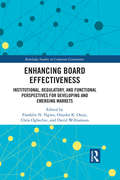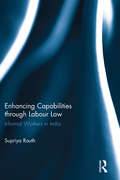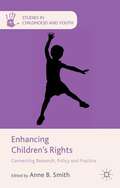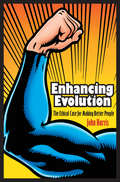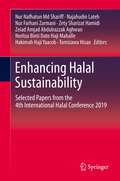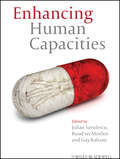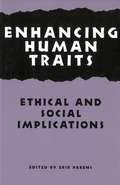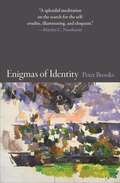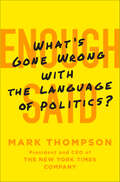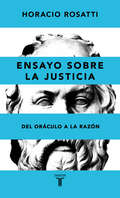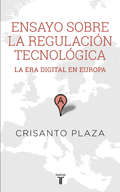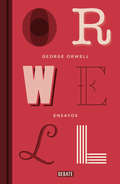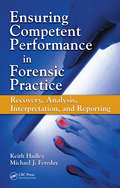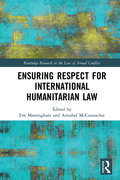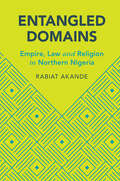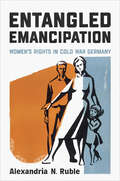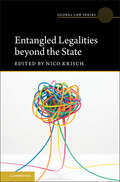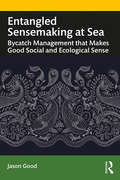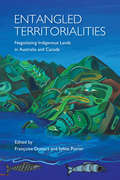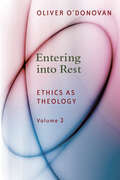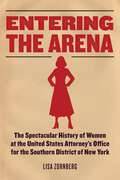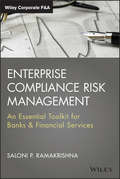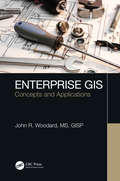- Table View
- List View
Enhanced Dispute Resolution through the Use of Information Technology
by Arno R. Lodder John ZeleznikowThe Bronze Age was a formative period in European history when the organisation of landscapes, settlements, and economy reached a new level of complexity. This book presents the first in-depth, comparative study of household economy and settlement in three micro-regions: the Mediterranean (Sicily), Central Europe (Hungary), and Northern Europe (South Scandinavia). The results are based on ten years of fieldwork in a similar method of documentation, and scientific analyses were used in each of the regional studies, making controlled comparisons possible. The new evidence demonstrates how differences in settlement organisation and household economies were counterbalanced by similarities in the organised use of the landscape in an economy dominated by the herding of large flocks of sheep and cattle. This book's innovative theoretical and methodological approaches will be of relevance to all researchers of landscape and settlement history.
Enhancing Board Effectiveness: Institutional, Regulatory and Functional Perspectives for Developing and Emerging Markets (Routledge Studies in Corporate Governance)
by David Williamson Chris Ogbechie Onyeka Osuji Franklin N. NgwuEnhancing Board Effectiveness seeks to examine the conceptualization and role of the board in a variety of contexts and articulate solutions for improving the effectiveness of the board, especially in developing and emerging markets. Enhancing Board Effectiveness with therefore address the following central questions: To what extent is the concept and role of the board evolving? What rights, powers, responsibilities and other contemporary and historical experiences can enhance the effectiveness of the board, especially in the particular contexts of developing and emerging markets? What socio-economic, political, regulatory and institutional factors/actors influence the effectiveness of the board and how can the policies and practices of such actors exert such influences? In what ways can a reconstructed concept of the board serve as a tool for theoretical, analytical, regulatory and pragmatic assessment of its effectiveness? In examining this issues, Enhancing Board Effectiveness will investigate theoretical, socio-economic, historical, empirical, regulatory, comparative and inter-disciplinary approaches. Academics in the relevant fields of accounting, behavioural psychology/economics, development studies, financial regulation, law and management/organizational studies, political economy and, public administration will find this book of high interest.
Enhancing Capabilities through Labour Law: Informal Workers in India
by Supriya RouthIn 2002 the International Labour Organization issued a report titled ‘Decent work and the informal economy’ in which it stressed the need to ensure appropriate employment and income, rights at work, and effective social protection in informal economic activities. Such a call by the ILO is urgent in the context of countries such as India, where the majority of workers are engaged in informal economic activities, and where expansion of informal economic activities is coupled with deteriorating working conditions and living standards. This book explores the informal economic activity of India as a case study to examine typical requirements in the work-lives of informal workers, and to develop a means to institutionalise the promotion of these requirements through labour law. Drawing upon Amartya Sen’s theoretical outlook, the book considers whether a capability approach to human development may be able to promote recognition and work-life conditions of a specific category of informal workers in India by integrating specific informal workers within a social dialogue framework along with a range of other social partners including state and non-state institutions. While examining the viability of a human development based labour law in an Indian context, the book also indicates how the proposals put forth in the book may be relevant for informal workers in other developing countries. This research monograph will be of great interest to scholars of labour law, informal work and workers, law and development, social justice, and labour studies.
Enhancing Children�s Rights
by Anne B. SmithThis volume explores how children's rights has influenced research with children and how research can in turn shape policies and practices to enhance children's rights. The book examines the impact children's rights and Childhood Studies has had on how children are constructed and regulated internationally.
Enhancing Evolution: The Ethical Case for Making Better People (Science Essentials Ser.)
by John HarrisIn Enhancing Evolution, leading bioethicist John Harris dismantles objections to genetic engineering, stem-cell research, designer babies, and cloning and makes an ethical case for biotechnology that is both forthright and rigorous. Human enhancement, Harris argues, is a good thing--good morally, good for individuals, good as social policy, and good for a genetic heritage that needs serious improvement. Enhancing Evolution defends biotechnological interventions that could allow us to live longer, healthier, and even happier lives by, for example, providing us with immunity from cancer and HIV/AIDS. Further, Harris champions the possibility of influencing the very course of evolution to give us increased mental and physical powers--from reasoning, concentration, and memory to strength, stamina, and reaction speed. Indeed, he says, it's not only morally defensible to enhance ourselves; in some cases, it's morally obligatory. In a new preface, Harris offers a glimpse at the new science and technology to come, equipping readers with the knowledge to assess the ethics and policy dimensions of future forms of human enhancement.
Enhancing Halal Sustainability: Selected Papers from the 4th International Halal Conference 2019
by Nur Nafhatun Md Shariff Najahudin Lateh Nur Farhani Zarmani Zety Sharizat Hamidi Zeiad Amjad Abdulrazzak Aghwan Norliza Binti Dato Haji Mahalle Hakimah Haji Yaacob Tomizawa HisaoThe global halal industry is likely to grow to between three and four trillion US dollars in the next five years, from the current estimated two trillion, backed by a continued demand from both Muslims and non-Muslims for halal products. Realising the importance of the halal industry to the global community, the Academy of Contemporary Islamic Studies (ACIS), the Universiti Teknologi MARA Malaysia (UiTM) and Sultan Sharif Ali Islamic University (UNISSA) Brunei have organised the 4th International Halal Conference (INHAC) 2019 under the theme “Enhancing Halal Sustainability'. This book contains selected papers presented at INHAC 2019. It addresses halal-related issues that are applicable to various industries and explores a variety of contemporary and emerging issues. It covers aspects of halal food safety, related services such as tourism and hospitality, the halal industry - including aspects of business ethics, policies and practices, quality assurance, compliance and Shariah governance Issues, as well as halal research and educational development. Highlighting findings from both scientific and social research studies, it enhances the discussion on the halal industry (both in Malaysia and internationally), and serves as an invitation to engage in more advanced research on the global halal industry.
Enhancing Human Capacities
by Guy Kahane Julian Savulescu Ruud Ter MeulenEnhancing Human Capacities is the first to review the very latest scientific developments in human enhancement. It is unique in its examination of the ethical and policy implications of these technologies from a broad range of perspectives.Presents a rich range of perspectives on enhancement from world leading ethicists and scientists from Europe and North AmericaThe most comprehensive volume yet on the science and ethics of human enhancementUnique in providing a detailed overview of current and expected scientific advances in this areaDiscusses both general conceptual and ethical issues and concrete questions of policyIncludes sections covering all major forms of enhancement: cognitive, affective, physical, and life extension
Enhancing Human Traits: Ethical and Social Implications
by Erik ParensIn this volume, scholars from philosophy, sociology, history, theology, women's studies, and law explore the looming ethical and social implications of new biotechnologies that are rapidly making it possible to enhance an individual's mental and physical attributes in ways previously only imagined. To clarify the issues, the contributors grapple with the central concept of "enhancement" and probe the uses and abuses of the term. Focusing in particular on the moral issues pertaining to cosmetic surgery and cosmetic psychopharmacology (a category which includes Prozac), they also examine notions of identity, authenticity, normality, and complicity. Other essays in this collection address the social ramifications of the new technologies, including the problems of access and fairness.
Enigmas of Identity
by Peter BrooksFrom eminent critic Peter Brooks, an exploration of the modern preoccupation with identity"We know that it matters crucially to be able to say who we are, why we are here, and where we are going," Peter Brooks writes in Enigmas of Identity. Many of us are also uncomfortably aware that we cannot provide a convincing account of our identity to others or even ourselves. Despite or because of that failure, we keep searching for identity, making it up, trying to authenticate it, and inventing excuses for our unpersuasive stories about it. This wide-ranging book draws on literature, law, and psychoanalysis to examine important aspects of the emergence of identity as a peculiarly modern preoccupation.In particular, the book addresses the social, legal, and personal anxieties provoked by the rise of individualism and selfhood in modern culture. Paying special attention to Rousseau, Freud, and Proust, Brooks also looks at the intersection of individual life stories with the law, and considers the creation of an introspective project that culminates in psychoanalysis.Elegant and provocative, Enigmas of Identity offers new insights into the questions and clues about who we think we are.
Enough Said: What's Gone Wrong with the Language of Politics?
by Mark ThompsonThere’s a crisis of trust in politics across the western world. Public anger is rising and faith in conventional political leaders and parties is falling. Anti-politics, and the anti-politicians, have arrived. In Enough Said, President and CEO of The New York Times Company Mark Thompson argues that one of the most significant causes of the crisis is the way our public language has changed. Enough Said tells the story of how we got from the language of FDR and Churchill to that of Donald Trump. It forensically examines the public language we’ve been left with: compressed, immediate, sometimes brilliantly impactful, but robbed of most of its explanatory power. It studies the rhetoric of western leaders from Reagan and Thatcher to Berlesconi, Blair, and today’s political elites on both sides of the Atlantic. And it charts how a changing public language has interacted with real world events – Iraq, the financial crash, the UK's surprising Brexit from the EU, immigration – and led to a mutual breakdown of trust between politicians and journalists, to leave ordinary citizens suspicious, bitter, and increasingly unwilling to believe anybody. Drawing from classical as well as contemporary examples and ranging across politics, business, science, technology, and the arts, Enough Said is a smart and shrewd look at the erosion of language by an author uniquely placed to measure its consequences.
Ensayo sobre la justicia: Del oráculo a la razón
by Horacio RosattiAsistiremos al lugar y el momento exactos en que la consideración de la idea de justicia experimenta un giro radical y fundante en la historia de Occidente: de destino inexorable impuesto por los dioses a deliberación racional enteramente humana. La más singular perspectiva para recorrer uno de los conceptos de mayor relevancia de nuestra vida. Este libro nos sitúa en el lugar y el momento exactos en que la consideración de la idea de justicia experimenta un giro radical y fundante en la historia de Occidente: de destino inexorable impuesto por los dioses a deliberación racional enteramente humana. A fin de explorar la relación entre libertad, desobediencia y responsabilidad, el autor recobra las incómodas preguntas que tanto Antígona como Sócrates -dispuestos ambos a sacrificar su propia vida para sostener principios que estiman valiosos- se formulan sobre su circunstancia, preguntas que agrietan la idea de justicia de su época y que resuenan aun en la actualidad: ¿Qué tan libres somos para responder por nuestros actos? ¿Cuánto margen tenemos para desobedecer una ley que creemos injusta? ¿Qué relación existe entre la justicia y la verdad? Tercer y último volumen de la trilogía escrita para Taurus por Horacio Rosatti, Ensayo sobre la justicia ofrece la más singular perspectiva para recorrer uno de los conceptos de mayor relevancia de nuestra vida.
Ensayo sobre la regulacion tecnologica: La era digital en Europa
by Crisanto PlazaUn revelador, heterodoxo y detallado documento sobre Europa y su posición rezagada en el entorno digitalEl fulgurante crecimiento del ecosistema digital #con la irrupción de sucesivas generaciones de redes de telecomunicación# y su globalización están marcando el desarrollo de la sociedad contemporánea, y transformando radicalmente todos los sectores económicos y nuestras vidas. Una regulación de esta nueva economía es un asunto crucial para lograr un motor de progreso que favorezca la innovación, atraiga inversiones y fomente el empleo. En este sentido, resulta imprescindible arbitrar mecanismos efectivos para liberar y encauzar todo el potencial que encierra el mundo digital.Crisanto Plaza, especialista en economía de las telecomunicaciones con una dilatada carrera profesional, reflexiona en esta obra sobre las oportunidades y los peligros que entraña el avance de la llamada «era digital » en Europa, ámbito en el que, frente a lo que ocurre en Estados Unidos, el sistema regulatorio se muestra como algo cerrado en sí mismo, incapaz de oxigenarse con todo aquello que le ofrece el entorno. De ahí que #como concluye el autor# sea indispensable potenciar el poder transformador que tienen las tecnologías de la información mediante una mejor regulación que incorpore un profundo razonamiento económico.
Ensayos
by George OrwellGeorge Orwell es el mejor ensayista inglés del siglo XX y esta es la mejor y más amplia antología de su obra. «Escribo porque existe alguna mentira que aspiro a denunciar, algún hecho sobre el cual quiero llamar la atención [...] pero no podría realizar el trabajo de escribir un libro, ni tampoco un artículo largo para una publicación periódica, si no fuera, además, una experiencia estética.» Así definía George Orwell, el ensayista inglés más importante del siglo XX, su pasión por la escritura. Esta amplia selección presenta por primera vez en español el abanico completo de sus intereses y pasiones, desde la literatura hasta la política, pasando por la taza de té perfecta o por qué los libros son más caros que los cigarrillos. Reseña:«Orwell desarrolló la prosa inglesa más clara y atractiva del siglo XX. Pero es obvio que era mucho más que un gran escritor. Hoy resulta necesario debido a su pasión por la verdad.»The Sunday Times
Ensuring Competent Performance in Forensic Practice: Recovery, Analysis, Interpretation, and Reporting
by Keith Hadley Michael J. FeredayThis is the first book of its kind to encourage a common understanding of competence and demonstrate the application of standards and practice in all aspects of forensic science including collection of evidence, interpretation of scientific analysis, and appropriate methods of testimony. The authors stress the standardization of proper training and testing procedures and give clear guidelines for effective training programs based on occupational standards. The book examines the importance of workplace assessments of competence and emphasizes the role of those involved in the assessment process. The authors include several case studies demonstrating competence in practice and the methods to ensure consistent high standards in the future.
Ensuring Respect for International Humanitarian Law (Routledge Research in the Law of Armed Conflict)
by Eve MassinghamThis book explores the nature and scope of the provision requiring States to ‘ensure respect’ for international humanitarian law (IHL) contained within Common Article 1 of the 1949 Geneva Conventions. It examines the interpretation and application of this provision in a range of contexts, both thematic and country-specific. Accepting the clearly articulated notion of ‘respect’ for IHL, it builds on the existing literature studying the meaning of ‘ensure respect’ and outlines an understanding of the concept in situations such as enacting implementing legislation, diplomatic interactions, regulating private actors, targeting, detaining persons under IHL in non-international armed conflict, protecting civilians (including internally displaced populations) and prosecuting war crimes. It also considers topical issues such as counter-terrorism and foreign fighting. The book will be a valuable resource for practitioners, academics and researchers. It provides much needed practical reflection for States as to what ensuring respect entails, so that governments are able to address these obligations.
Entangled Domains: Empire, Law and Religion in Northern Nigeria (Cambridge Studies in Law and Society)
by Rabiat AkandeSet in Colonial Northern Nigeria, this book confronts a paradox: the state insisted on its separation from religion even as it governed its multireligious population through what remained of the precolonial caliphate. Entangled Domains grapple with this history to offer a provocative account of secularism as a contested yet contingent mode of governing religion and religious difference. Drawing on detailed archival research, Rabiat Akande vividly illustrates constitutional struggles triggered by the colonial state's governance of religion and interrogates the legacy of that governance agenda in the postcolonial state. This book is a novel commentary on the dynamic interplay between law, faith, identity, and power in the context of the modern state's emergence from colonial processes.
Entangled Emancipation: Women’s Rights in Cold War Germany (German and European Studies #52)
by Alexandria RubleIn 1900, German legislators passed the Civil Code, a controversial law that designated women as second-class citizens with regard to marriage, parental rights, and marital property. Despite the upheavals in early twentieth-century Germany – the fall of the German Empire after the First World War, the tumultuous Weimar Republic, and the destructive Third Reich – the Civil Code remained the law of the land. After Nazi Germany’s defeat in 1945 and the founding of East and West Germany, legislators in both states finally replaced the old law with new versions that expanded women’s rights in marriage and the family. Entangled Emancipation reveals how the complex relationship between the divided Germanys in the early Cold War catalysed but sometimes blocked efforts to reshape legal understandings of gender and the family after decades of inequality. Using methods drawn from gender history and discourse analysis, the book restores the history of the women’s movements in East and West Germany. Entangled Emancipation ultimately explores the parallel processes through which East and West Germany reimagined, negotiated, and created new civil laws governing women’s rights after the Second World War.
Entangled Legalities Beyond the State (Global Law Series)
by Nico KrischLaw is usually understood as an orderly, coherent system, but this volume shows that it is often better understood as an entangled web. Bringing together eminent contributors from law, political science, sociology, anthropology, history and political theory, it also suggests that entanglement has been characteristic of law for much of its history. The book shifts the focus to the ways in which actors create connections and distance between different legalities in domestic, transnational and international law. It examines a wide range of issue areas, from the relationship of state and indigenous orders to the regulation of global financial markets, from corporate social responsibility to struggles over human rights. The book uses these empirical insights to inform new theoretical approaches to law, and by placing the entanglements between norms from different origins at the centre of the study of law, it opens up new avenues for future legal research. This title is also available as Open Access.
Entangled Sensemaking at Sea: Bycatch Management That Makes Good Social and Ecological Sense
by Jason GoodSustainable commercial fishing, species conservation, and bycatch are contentious topics. Great emphasis has been placed on the sustainable sourcing of particular species that we buy at the store and order in restaurants, but how can we trust that the fish on our plates, from a system-wide perspective, have been appropriately sourced? Even in what are commonly considered to be the best-managed fisheries in the world (i.e., Alaskan fisheries), thousands of tons of fish are wasted each year in the interest of providing certain species in certain ways to certain people, at certain prices. Are the management practices and regulations that we think are helping actually having the desired outcomes in terms of the effective use of natural resources? This book presents a framework that can enhance our understanding, research, and regulation of frontline organizing processes in commercial fisheries, which may be generalized to other resource extraction industries. It enables readers to better grasp and respond to the need to develop practices and regulations that involve effective use of all natural resources, rather than just a chosen few. The book is especially important to researchers and practitioners active in the fishing industry, and natural resource managers and regulators interested in understanding and improving their management systems. It is also highly relevant to organization and management researchers interested in coupled human and natural systems, ecological sensemaking, the role of quantum mechanics in organizational phenomena, sociomateriality, and sustainability. The book uses the real-world case of an Alaskan fishing fleet to explore how the commercial fishing industry (which includes businesses, management agencies, regulatory bodies, and markets, among others) entangles itself with natural phenomena in order to extract resources from them. After gaining a better understanding of these processes can we see how they can be improved, especially through changes to regulatory management systems, in order to foster not only more sustainable, but also less wasteful (these two goals are not necessarily interdependent in today's regulatory management systems), natural resource extraction and use. Such an understanding requires exploring how regulations, natural phenomena, human sensemaking processes, and market forces entangle at sea to materialize the fish that make their way to our plates - as well as those that, importantly, do not.
Entangled Territorialities: Negotiating Indigenous Lands in Australia and Canada
by Francoise Dussart Sylvie PoirierEntangled Territorialities offers vivid ethnographic examples of how Indigenous lands in Australia and Canada are tangled with governments, industries, and mainstream society. Most of the entangled lands to which Indigenous peoples are connected have been physically transformed and their ecological balance destroyed. Each chapter in this volume refers to specific circumstances in which Indigenous peoples have become intertwined with non-Aboriginal institutions and projects including the construction of hydroelectric dams and open mining pits. Long after the agents of resource extraction have abandoned these lands to their fate, Indigenous peoples will continue to claim ancestral ties and responsibilities that cannot be understood by agents of capitalism. The editors and contributors to this volume develop an anthropology of entanglement to further examine the larger debates about the vexed relationships between settlers and indigenous peoples over the meaning, knowledge, and management of traditionally-owned lands.
Entering into Rest: Ethics as Theology
by Oliver O'DonovanOliver O'Donovan's Ethics as Theology project began with Self, World, and Time, an "induction" into Christian ethics as ordered reflection on moral thinking within the life of faith. Volume 2, Finding and Seeking, shifted the focus to the movement of moral thought from a first consciousness of agency to the time that determines the moment of decision. In this third and final volume of his magnum opus, O'Donovan turns his attention to the forward horizon with which moral thinking must engage. Moral experience, he argues, is necessarily two-directional, looking both back at responsibility and forward at aims. The Pauline triad of theological virtues (faith, love, and hope) describes a form of responsibility, and its climax in the sovereignty of love opens the way to a definitive teleology.Entering into Rest offers O'Donovan's mature reflections on questions that have engaged him throughout his career and provides a synoptic view of many of his main themes.
Entering the Arena: The Spectacular History of Women at the United States Attorney’s Office for the Southern District of New York
by Lisa ZornbergThis book tells the spectacular history of women lawyers at the U.S. Attorney’s Office for the Southern District of New York (SDNY). SDNY is a storied institution, the oldest federal prosecutor’s office in the United States and its most renowned—and a critical player in New York City’s high-stakes legal arena. But its history has been only sparsely written about, and this is the first book to share the riveting account of how SDNY’s doors came to open to women lawyers. Remarkably, SDNY hired women lawyers far earlier than the Wall Street firms and other elite legal institutions. This book explores why that was. It begins in 1906 with Henry Stimson’s hiring of Mary Grace Quackenbos, the very first woman to hold an Assistant title anywhere in the Department of Justice. It continues with the SDNY women lawyers who intrepidly entered the arena throughout the Roaring Twenties, the Great Depression, and World War II, and who overcame the strict social conformities of the 1950s, when women who entered the law were seen as social “deviants.” It tells the previously untold full story of how women challenged the SDNY blockade of the 1960s that prevented them from serving as criminal prosecutors. And it culminates in the 1970s—when that blockade came down and the door to women’s entry was irrevocably blown off the hinges. Those SDNY women of the 70s went on to transform the bench and bar. Throughout, this book dissects and examines the close connection between SDNY’s hiring of women and its legacy of nonpartisan leadership, which is what drove SDNY’s emergence as an important American institution in the twentieth century and beyond.
Enterprise Compliance Risk Management
by Saloni Ramakrishnacomprehensive reference, providing a framework for keeping up-to-date with the multitude of diverse legal requirements and guidelines bankers face. Topics include:Active compliance management as a strategic interventionConnections to reputation, legal risk, governance, and customer satisfactionThe entire ecosystem of stakeholders outside of designated compliance officersOperation, training, and reporting of various compliance modelsThe book also includes a direct examination of "risk", including identification, measurement, mitigation, monitoring, remediation, and regulatory dialogue, and an exploration of multidimensional financial services that points out focal points for active compliance management. Compliance professionals seeking a handle on this vital but fledgling discipline can find the information they need in Enterprise Compliance Risk Management.
Enterprise Cybersecurity in Digital Business: Building a Cyber Resilient Organization
by Ariel EvansCyber risk is the highest perceived business risk according to risk managers and corporate insurance experts. Cybersecurity typically is viewed as the boogeyman: it strikes fear into the hearts of non-technical employees. Enterprise Cybersecurity in Digital Business: Building a Cyber Resilient Organization provides a clear guide for companies to understand cyber from a business perspective rather than a technical perspective, and to build resilience for their business. Written by a world-renowned expert in the field, the book is based on three years of research with the Fortune 1000 and cyber insurance industry carriers, reinsurers, and brokers. It acts as a roadmap to understand cybersecurity maturity, set goals to increase resiliency, create new roles to fill business gaps related to cybersecurity, and make cyber inclusive for everyone in the business. It is unique since it provides strategies and learnings that have shown to lower risk and demystify cyber for each person. With a clear structure covering the key areas of the Evolution of Cybersecurity, Cybersecurity Basics, Cybersecurity Tools, Cybersecurity Regulation, Cybersecurity Incident Response, Forensics and Audit, GDPR, Cybersecurity Insurance, Cybersecurity Risk Management, Cybersecurity Risk Management Strategy, and Vendor Risk Management Strategy, the book provides a guide for professionals as well as a key text for students studying this field. The book is essential reading for CEOs, Chief Information Security Officers, Data Protection Officers, Compliance Managers, and other cyber stakeholders, who are looking to get up to speed with the issues surrounding cybersecurity and how they can respond. It is also a strong textbook for postgraduate and executive education students in cybersecurity as it relates to business.
Enterprise GIS: Concepts and Applications
by John R. WoodardThis book defines and discusses how the field of Enterprise Architecture (EA) can be incorporated into the design of Enterprise Geographic Information Systems (EGIS). The objective of EA is to develop a strategic plan that structures an organization’s resources (data, information, people, and assets) into one team that works together to achieve the company’s objectives in an efficient, agile, and adaptable way. It demonstrates how EA concepts can be incorporated within EGIS by improving the system’s efficiency and reliability. Through real-world examples and step-by-step explanations, the reader will reach a comfortable understanding of the theories and methods discussed in the book.

